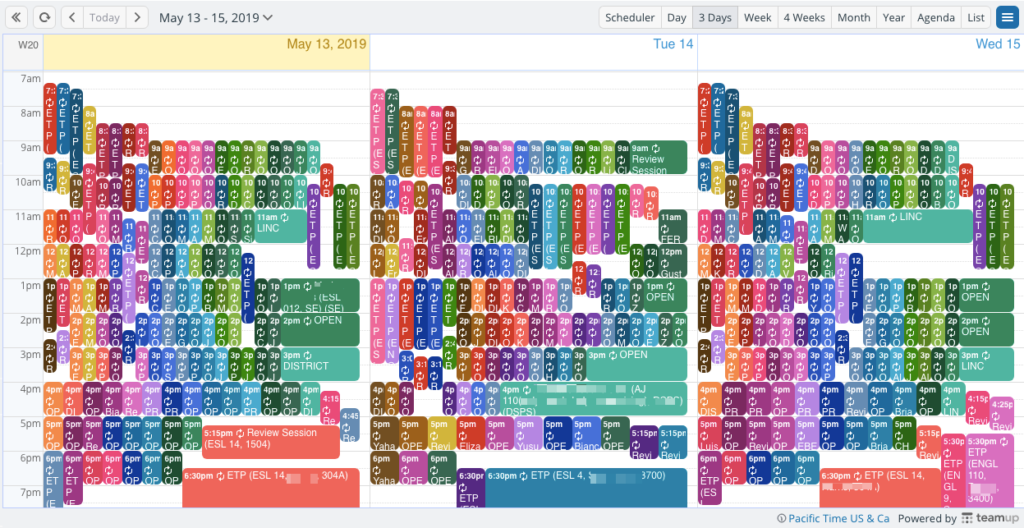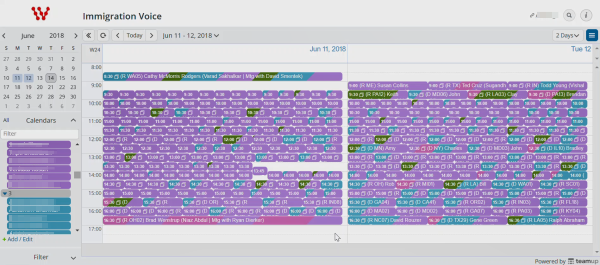Managing resources, spaces, and schedules is a time-consuming responsibility. The more people and options involved, the more complex the task becomes. One common issue is the “bottleneck syndrome.”
A single person holds the responsibility for managing the information, making decisions, and overseeing inputs. As a result, everyone else involved–from colleagues to clients–has to wait for this individual to process all information and make decisions.
You can avoid this type of scenario by setting up smart systems, delegating, and enabling everyone involved to do the work needed. Less waiting, more efficiency, and a better process all around: read on for more ideas and use cases.
Table of Contents
Appointment and space booking

Overseeing reservations for appointment slots, meetings, and spaces can range from very simple to very complex. For simple booking situations, when you need to make a few spaces or time slots available to a limited number of clients, Teamup is a great tool.
- Start here: How to Use Teamup for Simple Appointment and Space Booking and learn how to use Teamup for bookings via a sub-calendar method or the signup method.
- Read about A Story of Using Teamup for Tennis Court Bookings for a simple example of using Teamup for booking shared spaces.
- Read about how Teamup Helps Schedule Hundreds of Tutoring Sessions to learn how this busy tutoring center created an efficient system for booking hundreds of one-one-one tutoring sessions every semester.
- For managing rental property, read about How to Keep Track of Rental Bookings from Multiple Platforms. By creating a central booking calendar, you can ensure that you don’t miss reservations and don’t double-book your spaces.
Mobile booking system

Work is no longer a set of tasks performed from one location. You may be at your desk, in the car, in a meeting, or out and about. Particularly in booking situations, timing is important; unnecessary delays can create all sorts of problems. You need a booking system that can keep up with you.
- Read about A Decentralized, Mobile Booking System by Teamup used by a real Teamup user, a rehabilitation centre in Hong Kong.
- Learn how this On-Call Nanny Uses Teamup to Manage Clients and Booking: another inspiring, real-life user story. This busy, in-demand nanny set up a simple booking system for her clients. She can manage scheduling on the go, and her clients can quickly see her availability.
Special event bookings

Booking appointments or spaces may not be a regular part of your workload. Perhaps you’re coordinating a special event, conference, trade show, or other big project. In these cases, you need a system that is flexible enough to meet the demands of the event, accessible for everyone involved, and intuitive for users.
- Read about how Hannover Re Used Teamup to Enable Team Collaboration and Open Sessions. The team who coordinated this large corporate event used Teamup to enable on-the-go collaboration among participants. The mobile app enabled event participants to quickly schedule sessions and work together on topics and discussion.
- Learn How Immigration Voice Coordinates Hundreds of Volunteers with Teamup. This Teamup user is a large volunteer organization which coordinates large events several times a year. Each event involves hundreds of volunteers and hundreds of one-on-one meetings. Teamup helps them make it happen smoothly.
Prevent booking issues
Some common issues and problems come up in booking situations. With a little proactive prevention, many of these issues can be avoided.
- Avoid the information bottleneck: prevent information and communication from slowing up by delegating and decentralizing. When there is only one person who “knows the system,” everything depends on that one person. A better approach is to set up a secure system that is easy to use for many participants. Empowering others to do their own booking means less frustration for everyone. Learn How a Tennis Club Runs a Totally Decentralised Booking System.
- Require booking approval first: you may wish to enable others to do their own booking, but certain details need to be reviewed and approved first. If that’s the case, you can set up a simple approval process that lessens the workload without allowing unapproved bookings to “go live.” Read about How to Use Teamup Calendar as an Approval System.
- Prevent double-booking: a nightmare scenario for any event or space coordinator, double-bookings cause a host of problems and are messy to fix. The best cure is prevention. Learn how calendar settings in Teamup can help prevent this problem from happening: How Calendar Permissions Prevent Double Bookings for a Wellness Centre.
- Missed booking opportunities: it’s frustrating to realize you’ve missed a booking or opportunity because you weren’t able to respond quickly enough. A shared booking system–and one that’s available on mobile–can make it easier to coordinate schedule, make decisions, and book the right opportunities as they arise. Learn how this Australian Rock Band Uses Teamup for Instant Decision Making in their bookings.
At Teamup, we advocate efficiency for everyone. Efficiency simply means getting the best results from the fewest resources. In many cases, a few simple changes and a well-designed calendar system can take the pain and inefficiency out of the booking process.
Photo by Ricardo Jimenez on Unsplash

